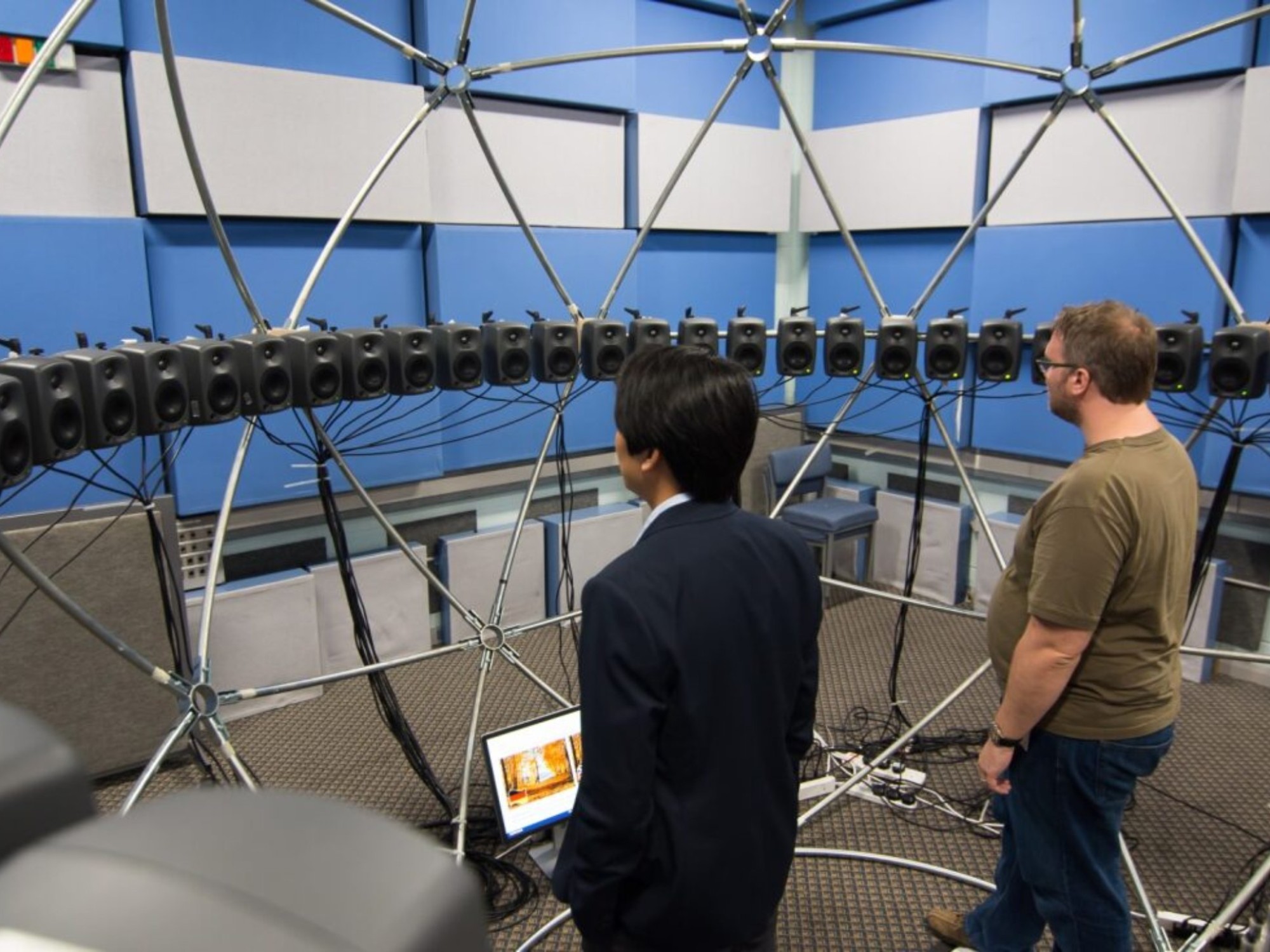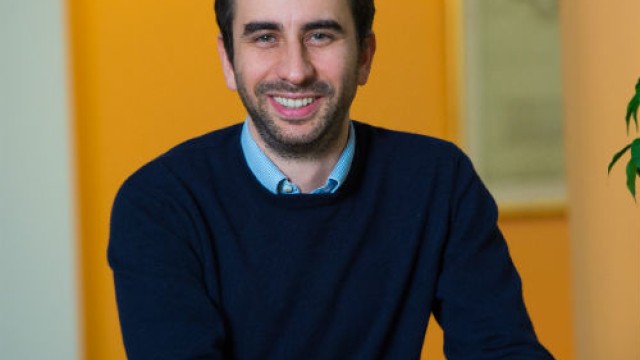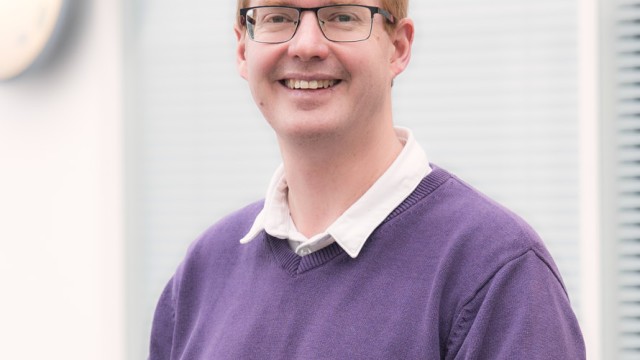
- Audio Engineering
PhD Audio Engineering
Our primary goal is simply this: to make sound better. We’re interested in human perceptions of audio quality, particularly of high-fidelity music signals. Our research combines elements of acoustics, digital signal processing, psychoacoustics, psychology, sound synthesis, software engineering, statistical analysis and user-interface design, with an understanding of the aesthetics of sound and music.
4,138+ people have created a bespoke digital prospectus
Why choose this
programme?
- Since the Institute of Sound Recording was created in 1998, we have become known internationally as a leading centre for research in psychoacoustic engineering.
- Our research aims to provide tools to assist in any area where assessment of the quality of audio as perceived by human listeners is desirable but, for one reason or another, potentially problematic. We provide complementary tools to allow appropriate adjustment where the assessed quality can be improved. More generally, we aim to engineer perceptually-motivated signal analysis, processing and control systems.
- We have doubled the facilities space, and our Performing Arts Technology Studios have been upgraded and complemented by a £1.7m investment in state-of-the-art production and media suites, and we have significant funding from research councils and industry.
- We belong to TECHNE, an Arts and Humanities Research Council (AHRC)-funded doctoral training partnership, which provides access to comprehensive academic and professional training programmes, as well as the possibility of funding for your studies.
Statistics
Research excellence
We are ranked in the top 20 for the quality of our research outputs - Research Excellence Framework (REF) 2021
100%
Of our music and media research graduates are in employment or further education (Graduate Outcomes 2025, HESA)
What you will study
Our Audio Engineering PhD will prepare you for success at each stage of your project. The structure is designed to provide intensive graduate preparation for a future career and is suitable for either part-time or full-time candidates. You can also study for an MPhil with us; the differences between an MPhil and PhD is in the volume, originality and significance of the work you will do.
You’ll begin your project with a thorough review of previously published academic literature in relevant areas, which will lead to a critical/analytical report. The conclusions to this report will suggest an appropriate next step, which will normally be some sort of experimental study, designed to test a hypothesis you have formulated from your literature review.
Your study might involve, for example, software design, acoustic measurements and listening tests. The results of this study will be written up in another report (and possibly as a conference paper) which will include a discussion of their significance to your project. Your literature review and experimental study, perhaps together with some additional reading or experimentation, will lead to either:
- MPhil: A thesis (around 50,000 words) drawing appropriate conclusions, and a viva examination. Alternatively, it may be possible at this stage to transfer to PhD registration.
- PhD: A full progress report drawing appropriate conclusions, refining research questions and detailing a research plan to allow these questions to be answered, together with a viva examination.
For a PhD, once you’ve completed a satisfactory progress report and viva examination, you’ll carry out the research plan defined in your progress report. This will lead to further literature-based and experimental research, conference (and possibly journal) publications, and your final PhD thesis (around 70,000 words), and a viva examination.
Assessment
Your final assessment will be based on the presentation of your research in a written thesis, which will be discussed in a viva examination with at least two examiners.
You have the option of preparing your thesis as a monograph (one large volume in chapter form) or in publication format (including chapters written for publication), subject to the approval of your supervisors.
Location
This course is based at Stag Hill campus. Stag Hill is the University's main campus and where the majority of our courses are taught.
Research themes
Research themes include:
- Acoustic and binaural modelling
- Algorithms to predict human auditory perception
- Audio networks
- Audio rendering for augmented reality/virtual reality/mixed reality
- Biomedical acoustics
- Object-based spatial audio
- Multichannel audio
- Perceptually optimized sound field control
- Room acoustic modelling
- Sound synthesis of musical instruments
- Timbral analysis and characterisation.
Discover a full list of recent and current Institute of Sound Recording research projects.
See a full list of all our music and media academic staff.
Currently available Institute of Sound Recording research supervisors are:
Research support
The professional development of postgraduate researchers is supported by the Doctoral College, which provides training in essential skills through its Researcher Development Programme of workshops, mentoring and coaching. A dedicated postgraduate careers and employability team will help you prepare for a successful career after the completion of your PhD.
Throughout the project, you’ll get regular guidance through meetings with your supervisor(s). Your progress will be reviewed formally twice a year, and you’ll benefit from internal seminars to share and discuss findings with other research students.
Your training needs will be identified and met by the University's internal postgraduate research training, modules from the University's taught degree programmes, external courses or guided reading.
Postgraduate research students are strongly encouraged to work here at the University. We have shared office space for all our research students, and it can be very valuable to work alongside others with similar interests and complementary expertise. It’s also useful to be close to the Institute of Sound Recording's academic staff, our technical facilities and the University's Library and other learning resources.
Depending on the nature of your research project, however, it may be possible to undertake much of it away from the University, as long as you stay in regular contact with your supervisor(s) and attend research seminars and progress reviews, which happen twice a year.
Facilities
PhD students have access to office space, computers and a range of research tools and resources, from transcription equipment to data analysis software. Our facilities in our Performing Arts Technology Studios have recently been upgraded and complemented by our new £1.7m state-of-the-art production and media suites. They include state-of-the-art recording studios, edit rooms and a listening room.
Edit rooms
The edit rooms are used for a wide range of audio post-production tasks and our ITU-R BS.1116 critical listening room and audio laboratory (designed and built by Munro Associates) are used by students and researchers to undertake experimental work involving audio measurement and subjective listening tests.
Listening room
Our listening room is air-conditioned to provide a comfortable working environment and is equipped with a flexible range of reproduction systems from stereo to multichannel including elevated loudspeakers. This enables listening tests on multichannel surround sound to be carried out effectively.
The room contains a loudspeaker mounting system that can be rigged with a large number of loudspeakers. It is usually configured for 22.2 reproduction, using 22 Genelec 8330A loudspeakers and two Genelec 7350A subwoofers. The system includes distributed bass management and built-in time alignment and equalisation of level and frequency response. The system is flexible enough to allow almost any multichannel loudspeaker arrangement, and additional loudspeakers can be added for any format (up to 72 Genelec 8020 loudspeakers).
There is also a pair of B&W 801 loudspeakers with a Chord amplifier for two-channel stereo, and a set of five Genelec 1032A loudspeakers and a Genelec 1094A subwoofer for 5.1 surround sound.
Equipment
The Institute also has a wide range of test and measurement equipment that can be used in the listening room or around campus, including:
- Prism DScope 3 audio test system
- Audio Precision 2700 audio test system
- MLSSA measurement equipment (running on PC)
- B&K 2033 real time audio analyser
- Neutrik Cortex MK2 binaural recording and measurement system
- B&K acoustic test equipment and microphones
- Neutrik Acoustilyzer acoustical analysis system
- Lindos MiniSonic MS20 audio test system
- A selection of scopes, oscillators, audio test sets.
We own a large range of professional quality microphones that can be used by our students. The extensive range covers all the major brands from classic valve microphones to the latest designs. As the choice of microphone is vital in recording, we pride ourselves on having a range of microphones which let our students achieve the highest possible professional standards.
Audio network
All studios, edit rooms and acoustic rooms in the new space are linked by a new Dante digital audio network, providing audio interconnection between each room, plus video interconnects for flexible configurations of the recording spaces and studios.
UK qualifications
Applicants are expected to hold a high level of academic achievement in relevant science/engineering subject areas and a clear aptitude for research are required.
Typically, this will mean a first or upper second-class (2:1) bachelors degree with a significant final-year project or dissertation, or a masters degree achieving or approaching distinction, with a significant research project element.
English language requirements
IELTS Academic: 6.5 or above (or equivalent) with 6.0 in each individual category.
These are the English language qualifications and levels that we can accept.
If you do not currently meet the level required for your programme, we offer intensive pre-sessional English language courses, designed to take you to the level of English ability and skill required for your studies here.
Selection process
Selection is based on applicants:
- Meeting the expected entry requirements and providing all relevant documents including a satisfactory research proposal
- Being shortlisted through the application screening process
- Completing a successful interview
- Providing suitable references.
Fees per year
Explore UKCISA's website for more information if you are unsure whether you are a UK or overseas student. View the list of fees for all postgraduate research courses.
* Please note: any start date other than September will attract a pro-rata fee for that year of entry (75 per cent for January, 50 per cent for April and 25 per cent for July).
July 2026 - Full-time
- UK
- £5,006
- Overseas
- £21,000
July 2026 - Part-time
- UK
- £2,503
- Overseas
- £10,500
October 2026 - Full-time
- UK
- £5,238
- Overseas
- £24,300
October 2026 - Part-time
- UK
- £2,619
- Overseas
- £12,200
January 2027 - Full-time
- UK
- £5,238
- Overseas
- £24,300
January 2027 - Part-time
- UK
- £2,619
- Overseas
- £12,200
April 2027 - Full-time
- UK
- £5,238
- Overseas
- £24,300
April 2027 - Part-time
- UK
- £2,619
- Overseas
- £12,200
- Annual fees will increase by 4% for each year of study, rounded up to the nearest £100 (subject to legal requirements).
Additional costs
There are additional costs that you can expect to incur when studying at Surrey.
Funding
A Postgraduate Doctoral Loan can help with course fees and living costs while you study a postgraduate doctoral course.
Studentships
Browse our frequently updated list of funded studentships open for applications.
Application process
Applicants should contact potential supervisors before submitting an application via the website. Please refer to section two of our application guidance.
Apply online
To apply online first select the course you'd like to apply for then log in.
Select your course
Choose the course option you wish to apply for.
Sign in
Create an account and sign into our application portal.
The closing date is the last day this month is available for applications, but if you are applying through a studentship you must follow the deadline on the advert to be eligible.
ApplyThe closing date is the last day this month is available for applications, but if you are applying through a studentship you must follow the deadline on the advert to be eligible.
ApplyThe closing date is the last day this month is available for applications, but if you are applying through a studentship you must follow the deadline on the advert to be eligible.
ApplyThe closing date is the last day this month is available for applications, but if you are applying through a studentship you must follow the deadline on the advert to be eligible.
ApplyThe closing date is the last day this month is available for applications, but if you are applying through a studentship you must follow the deadline on the advert to be eligible.
ApplyThe closing date is the last day this month is available for applications, but if you are applying through a studentship you must follow the deadline on the advert to be eligible.
ApplyThe closing date is the last day this month is available for applications, but if you are applying through a studentship you must follow the deadline on the advert to be eligible.
ApplyThe closing date is the last day this month is available for applications, but if you are applying through a studentship you must follow the deadline on the advert to be eligible.
ApplyAfter registration
Students are initially registered for a PhD with probationary status and, subject to satisfactory progress, subsequently confirmed as having PhD status.
About the University of Surrey
Need more information?
Contact our Admissions team or talk to a current University of Surrey student online.
Code of practice for research degrees
Surrey’s postgraduate research code of practice sets out the University's policy and procedural framework relating to research degrees. The code defines a set of standard procedures and specific responsibilities covering the academic supervision, administration and assessment of research degrees for all faculties within the University.
Download the code of practice for postgraduate research admissions (PDF).
Terms and conditions
When you accept an offer to study at the University of Surrey, you are agreeing to follow our policies and procedures, student regulations, and terms and conditions.
We provide these terms and conditions at the offer stage and are shown again at registration. You will be asked to accept these terms and conditions when you accept the offer made to you.
View our generic registration terms and conditions (PDF) for the 2025/26 academic year, as a guide on what to expect.
Disclaimer
This online prospectus has been published in advance of the academic year to which it applies.
Whilst we have done everything possible to ensure this information is accurate, some changes may happen between publishing and the start of the course.
It is important to check this website for any updates before you apply for a course with us. Read our full disclaimer.




